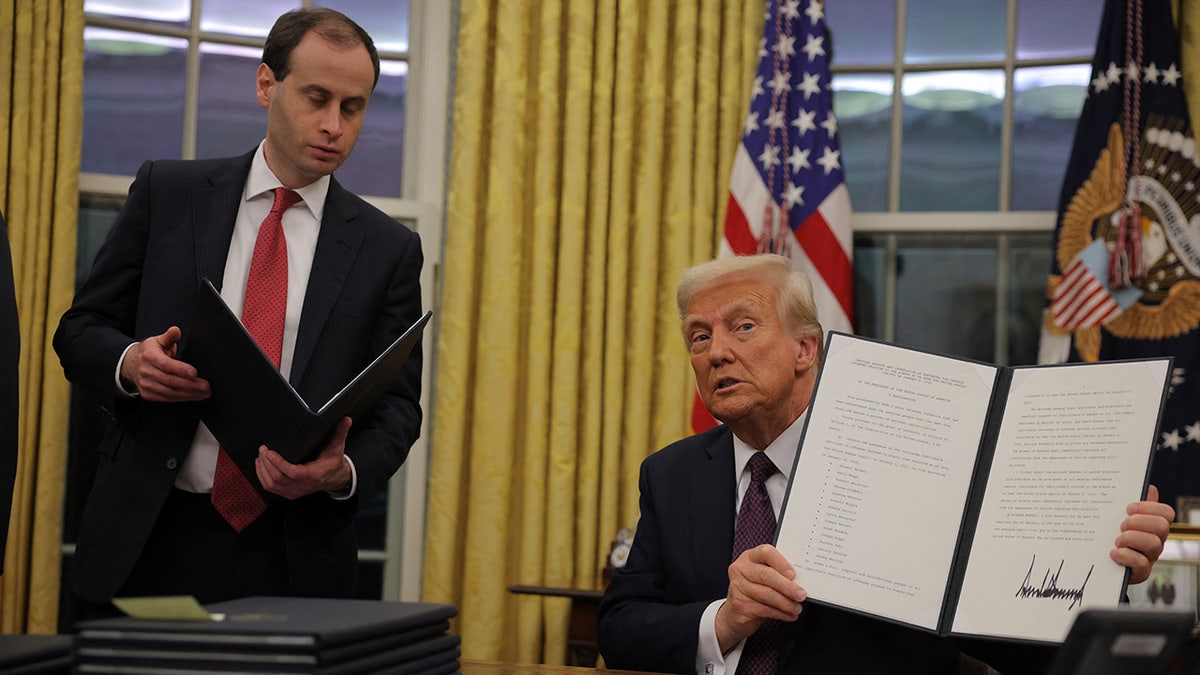Presidential Power And Pardons: Examining Trump's Decisions

Table of Contents
The Constitutional Basis of Presidential Pardons
The constitutional authority for presidential pardons is enshrined in Article II, Section 2, Clause 1 of the US Constitution. This clause grants the President the power "[to] grant Reprieves and Pardons for Offenses against the United States, except in Cases of Impeachment." This seemingly straightforward wording has been the subject of considerable legal and political interpretation over the centuries.
Article II, Section 2: The Foundation of Presidential Pardon Power
The historical context of this clause is crucial to understanding its application. The framers of the Constitution, drawing on English common law, intended the pardon power to be a significant check on the judiciary and a tool for executive clemency. They envisioned it as a means to correct potential injustices within the legal system, allowing the President to temper the harshness of the law in specific instances.
Limitations on Presidential Pardon Power
Despite its broad wording, the presidential pardon power is not absolute. The most significant limitation is explicitly stated in the Constitution itself: the President cannot pardon individuals who have been impeached. This exception ensures that the impeachment process, a vital mechanism for holding the President and other high-ranking officials accountable, remains unaffected by executive clemency.
- Historical Context: The pardon clause reflects a long-standing tradition of executive clemency, dating back to English monarchical practices.
- Key Supreme Court Cases: Cases such as Ex parte Grossman (1925) have shaped the understanding of the scope of pardon power, clarifying its application to federal crimes and clarifying that it applies to both penalties and convictions.
- The "Unfettered" Debate: There's ongoing debate regarding whether the pardon power is truly "unfettered," or whether there are implicit limitations based on principles of justice and the rule of law.
- Past Presidential Pardons: Comparing Trump's actions to those of past presidents, such as Gerald Ford's pardon of Richard Nixon, offers valuable context and illuminates varying interpretations of this power.
Trump's Pardon Decisions: A Case Study
President Trump's use of the pardon power was unprecedented in both its frequency and the selection of recipients. His decisions frequently drew intense public scrutiny and criticism.
High-Profile Pardons
Many of Trump's pardons involved individuals with close ties to his administration, his campaign, or his personal life. These included high-profile figures convicted of various offenses, raising concerns about potential political motivations and conflicts of interest.
Controversial Pardons and their Justifications
Numerous pardons granted by Trump sparked significant controversy due to the nature of the crimes committed and the perceived lack of sufficient justification offered by the administration. The rationale provided for some pardons was often vague or insufficient, leading to accusations of abuse of power.
- Key Individuals Pardoned: This includes individuals like Roger Stone, Michael Flynn, and Paul Manafort, among others, each convicted of different federal crimes.
- Public Reaction: The public's response to these pardons was largely negative, with many perceiving them as politically motivated and undermining the principles of justice.
- Legal Expert Commentary: Legal scholars and commentators widely criticized many of these pardons, arguing that they set a dangerous precedent and eroded public trust in the fairness of the justice system.
- Political Motivations: Many observers pointed to the potential political motivations behind several pardons, arguing that they served to protect allies or reward loyalty.
The Impact of Trump's Pardon Decisions
The consequences of Trump's pardon decisions extend beyond the immediate individuals involved, impacting the legal system and the political landscape.
Legal and Ethical Implications
The sheer number and nature of Trump's pardons raised serious concerns about the integrity of the justice system. Critics argued that his actions undermined the rule of law, potentially discouraging future prosecutions and investigations. This could lead to a climate of impunity, where powerful individuals believe they are above accountability.
Political Ramifications
Trump's pardon decisions had profound political ramifications. They fueled partisan divisions, further polarizing public opinion and intensifying debates surrounding presidential power and accountability. This has also impacted future political calculations, with the potential for pardons to become a tool for political reward or retribution.
- Erosion of Public Trust: Many polls showed a significant decline in public trust in the justice system following Trump's pardon decisions.
- Impact on Future Prosecutions: The potential chilling effect on future investigations and prosecutions is a significant concern, particularly given the broad reach of the presidential pardon power.
- Influence on the Political Landscape: Trump's pardons became a significant political issue, influencing campaigns, shaping public discourse, and setting the stage for future debates about executive authority.
- Debate Surrounding Presidential Power: The Trump presidency reignited important conversations about the limits and appropriate uses of presidential power, including the pardon power.
Comparison with Previous Presidents' Use of Pardons
Examining Trump's actions within a historical context reveals significant differences in the frequency and rationale behind presidential pardons.
Historical Context
While all presidents have used the pardon power, the extent and nature of its use have varied greatly throughout history. Some presidents have exercised this power sparingly, while others have employed it more frequently, reflecting differing philosophies and political priorities.
Establishing a Baseline
Comparing the frequency and types of pardons issued across various presidential administrations reveals substantial variation. This allows for a more nuanced understanding of the context and rationale surrounding pardon decisions, and highlights the potential for abuse when the power is used excessively or without transparency.
- Examples of Presidential Pardon Usage: Presidents like Ford (Nixon pardon), Carter (many pardons for Vietnam War draft evaders), and others, provide valuable comparative data points.
- Differing Contexts and Political Climates: Understanding the historical context – political climate, social attitudes towards crime, and prevailing legal norms – is key to interpreting presidential pardon decisions.
- Recurring Patterns or Trends: Analyzing historical data on presidential pardons can reveal patterns and trends, helping to identify potential risks and abuses of the power.
Conclusion
The examination of Presidential Power and Pardons, particularly in the context of Trump's actions, reveals the complexities of balancing executive authority with the principles of justice and the rule of law. His unprecedented use of the pardon power sparked significant debate, raising critical questions about the scope, limitations, and potential for abuse of this significant executive tool. The potential erosion of public trust and the impact on the integrity of the justice system highlight the need for ongoing scrutiny.
Call to Action: The examination of Presidential Power and Pardons, particularly in the context of Trump's actions, highlights the need for ongoing critical analysis of this powerful executive tool. Further research into the historical, legal, and political aspects of presidential pardons is crucial to ensuring accountability and transparency in the exercise of this authority. Understanding the nuances of presidential pardons and their implications is essential for safeguarding the integrity of the American justice system.

Featured Posts
-
 Viet Jet In Financial Jeopardy Court Ruling On Payment Stay
May 16, 2025
Viet Jet In Financial Jeopardy Court Ruling On Payment Stay
May 16, 2025 -
 Vont Weekend 2025 104 5 The Cats Photo Highlights
May 16, 2025
Vont Weekend 2025 104 5 The Cats Photo Highlights
May 16, 2025 -
 Paddy Pimblett And The Ufc 314 Championship Prediction
May 16, 2025
Paddy Pimblett And The Ufc 314 Championship Prediction
May 16, 2025 -
 March 22nd Nhl Matchup Maple Leafs Vs Predators Prediction
May 16, 2025
March 22nd Nhl Matchup Maple Leafs Vs Predators Prediction
May 16, 2025 -
 San Diego Padres Games Your Guide To Streaming Without Cable 2025
May 16, 2025
San Diego Padres Games Your Guide To Streaming Without Cable 2025
May 16, 2025
